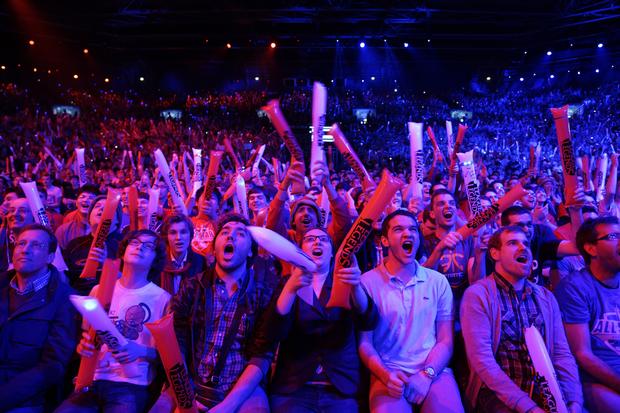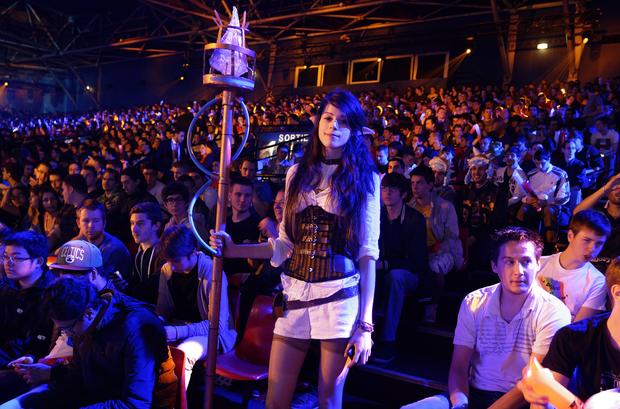3 Reasons You'll Be Seeing E-Sports More And More
If you looked at this headline and had no idea what e-sports are, here's an explainer: E-sports are video games played competitively, often at incredibly high stakes, before a massive, global audience.
And if you surf YouTube or watch ESPN, you'll likely see e-sports more and more, as advertisers – like Red Bull, Coke, and American Express -- look to catch the eye of a coveted demographic: young men.
In the last few years, the prize pools for these video game competitions have grown immensely. Just last week, the purse for the championship of the team strategy game "Dota 2" surpassed $15 million. That's more than the prize pool for the prestigious Master's golf tournament, which sits at $10 million.
In the span of half a decade, e-sports have suddenly emerged as a part of the global sporting landscape. Below are a few reasons why.
1. The Money Is No Joke
The $15 million prize pool mentioned above is for a yet-to-be-played tournament called The International 5.
Valve Corporation, the company that makes the free-to-play computer game "Dota 2," will host the tournament next month in Seattle, where the best Dota teams from around the world will compete for a multi-million dollar top prize.
This kind of money has not only snagged headlines in major newspapers, it's also helped turn gaming into a global spectator sport.
The world's best players can practice full-time toward winning lucrative tournaments like the International, the companies and businesses that host these tournaments make money off tickets, advertisements and in-game transactions, and the fans tune in by the tens of millions to watch their favorite players compete in real time.
Aside from "Dota 2", games like "League of Legends" and "Call of Duty" have prize pools that stretch to seven figures, and several other games have tournaments that award their elite players thousands of dollars in prize money.
In some games, top players even make considerable salaries. One top "League of Legends" player from Korea reportedly makes between $98,000 -$147,000 a year, and that doesn't include any of the prize money.
For parents worried their kids will try to be pro gamers, they can take some small comfort in knowing that playing games can pay off in a few ways. Some colleges are now awarding scholarships to e-sports athletes, who could go on to play before crowds far greater than those that watch NCAA.
2. The E-sports Audience Is Massive, Growing
The e-sports audience is different from the general sporting audience in a few ways.
First off, it's not tied to any country or region. While the biggest part of the gaming audience is in Asia, the competitions are also watched by millions in Europe, the Americas and southeast Asia.
Secondly, e-sports fans are different from regular sporting fans in that many of those who watch the games also play them, and do so avidly. Games like "Dota 2" and "League of Legends" boast some of the biggest audiences right now. "Dota 2" has an active monthly user base of more than 10 million players, and "League" has goliath base of some 67 million monthly players. That's equivalent to the entire population of Thailand.
And when these fans aren't playing, they'll tune into to the competitions, which are often highlighted, if not hosted, by game developers.
For last year's "League" world championship in Seoul, 27 million unique users tuned in online to watch the contest. That's more viewers than last year's World Series and the NBA finals got combined.
These kinds of player bases and viewer numbers are making developers lots of money. Riot, the maker of "League," pockets around $123 million a month while "Dota 2"'s maker is said to collect $18 million a month. The industry is said to have $1 billion potential.
3. Amazon, Google Want In
The massive viewer numbers for e-sports competitions have not gone unnoticed.
The contests, both big and small, are usually streamed online via a website called Twitch TV, which Amazon recently bought for $1.1 billion.
Along with showing e-sports competitions, Twitch also allows players, pros or otherwise, to stream their games to the community. This affords e-sports fans a way to be closer to their star cyber athletes.
Fans will watch the best of the best practice for hours, gleaning both more knowledge about the game and the player's personality. The amount of video content on Twitch is immense, and experts say it already generates more viewing minutes than videos put out by the NFL.
Google, the owner of YouTube, had been looking to buy Twitch before Amazon gobbled them up. Now, YouTube is aiming to revamp its own live streaming service to compete with Twitch, focusing on gaming and e-sports. Previously, YouTube's streaming service had failed to find a foothold, despite streaming presidential addresses and cricket championships in India.
Outside the internet, e-sports are also expanding into traditional media. The championship match of the new title "Heroes of the Storm" was broadcast live on ESPN 2 this spring.
The Takeaway…
Being that more than half of the U.S. population says they play video games in one way or another, e-sports has a lot of room to grow.
And as gaming comes out of the basement and into a much more visual internet ecosystem, the social and business infrastructure around e-sports will likely be built up. That means e-sports have the opportunity to be a enjoyed by people who aren't boys or young men living with their parents.
For instance, there could be gender parity in game competitions, being that there's no physical reason why girls couldn't play against boys (or team up with them) in a cyber-arena. People with certain disabilities could also join in and go head-to-head with their able-bodied counterparts.
Of course, this is all uncharted territory and speculation. Whether e-sports lives or dies will depend not so much on how many millions of dollars are in the prize pools, but if the community can grow, attract a new generation of players and build a sustainable ecosystem.
While it's impossible to tell where the future of e-sports lies, it's hard to deny that it could be just as big of an enterprise as "traditional" sports.





